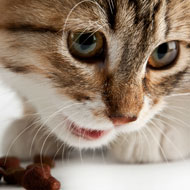
A recent report shows pet food sales in 2013 boosted the European pet market to €8.5 billion
A recent report suggests pet owners helped to keep the European pet market afloat in 2013, despite the continuing recession.
The Pulse Report was launched during National Pet Month in the UK, and showed that last year's pet market was worth €8.5 billion, growing in value by 1.7 per cent across six key markets - France, Germany, the Netherlands, Spain, Italy and the UK.
The report, which is published by global market and shopper intelligence firm IRI, reveals trends and insights into popular retail categories across the UK and Europe.
According to IRI, this growth in value was driven by an increase in product price inflation and the availability of smaller sizes of premium branded products, rather than the volume of sales.
In consistency with previous years, cat food appears to be the trendsetter in pet care, representing more than half of all pet care sales across Europe in 2013. Cat owners in particular fuelled the market's success, with cat food delivering the fastest growth after pet accessories. This growth in cat food sales was driven by the availability of single-serving packs of wet and dry cat food, and especially of premium brands.
The report also showed that dog food increased its share in 2013, but at a slower pace, with sales of more than €3 billion driven by dog snacks and treats.
Paulo Garro, Director of Business Insights IRI, says:
"It's interesting that pet care appears to be an increasingly polarised category. Shoppers are trading down, with private labels growing across most European markets, offering a cheaper but acceptable alternative to premium brands during challenging economic times. But shoppers are unique in this market, and a dog owner may shop very differently to a cat owner, so manufacturers must continue to innovate and defend their brand equity."
According to the report, there was limited product innovation in 2013 compared to previous years, with the exception of the major brands developing premium tastes in small sizes, or new user friendly packages. "Oral care" snacks and treats continued to grow in importance.
The IRI Pulse Report for pet care can be viewed here.



 The Veterinary Medicines Directorate (VMD) is inviting applications from veterinary students to attend a one-week extramural studies (EMS) placement in July 2026.
The Veterinary Medicines Directorate (VMD) is inviting applications from veterinary students to attend a one-week extramural studies (EMS) placement in July 2026.